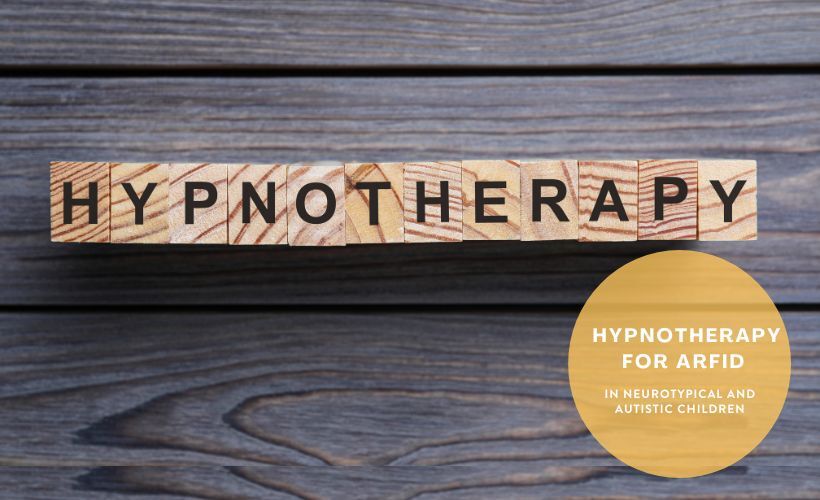
Hypnotherapy for ARFID in Neurotypical and Autistic Children may be just what your family needs.
Parenting comes with its challenges, and for some, navigating mealtime battles with an extremely fussy eater can be particularly daunting. Whether your child is neurotypical or on the autism spectrum, dealing with Avoidant/Restrictive Food Intake Disorder (ARFID) presents a set of unique challenges. In this blog post, we’ll explore the potential of hypnotherapy as an unconventional yet promising approach to address ARFID in both neurotypical and autistic children.
Understanding ARFID: More Than Just Fussy Eating
ARFID goes beyond typical fussy eating behaviours. It involves an extreme aversion and phobia to certain foods, textures, smells, or colours, leading to a limited and often limited diet. This disorder can impact a child’s physical health, social interactions, and overall well-being.
Hypnotherapy and Neurotypical Children with ARFID: A New Perspective
For neurotypical children, addressing ARFID through hypnotherapy involves tapping into the power of the subconscious mind. Hypnotherapy can help create positive associations with food, transforming mealtime from a source of anxiety into an opportunity for nourishment and enjoyment. By addressing the underlying factors contributing to the aversions, hypnotherapy opens doors to a broader range of food acceptance.
Hypnotherapy and Autistic Children: Tailoring the Approach
Children on the autism spectrum often face sensory challenges that contribute to ARFID. Hypnotherapy, when adapted to the unique needs of autistic individuals, proves to be a valuable tool. Professional hypnotherapists, specialising in autism, understand the importance of individualised sessions that consider sensory sensitivities and communication preferences. By working collaboratively with the child, hypnotherapy aims to foster a positive relationship with food.
The Mechanics of Hypnotherapy for ARFID: What to Expect
Hypnotherapy sessions for ARFID typically involve creating a relaxed state where the mind is receptive to change. Conversations, breathing exercises, and guided hypnosis help children explore positive aspects of food, unravelling the roots of aversions. The goal is to replace negative associations with food with positive ones, empowering children to expand their food choices.
Is Hypnotherapy Right for Your Extreme Fussy Eater?
Deciding whether hypnotherapy is suitable for your child is a personal choice. If traditional approaches have not yielded the desired results, exploring alternative therapies like hypnotherapy could be a worthwhile consideration. It’s essential to consult with a qualified hypnotherapist who specialises in working with children and understands the nuances of ARFID.
Empowering Your Child’s Relationship with Food
If you find yourself grappling with the challenges of ARFID in your child, consider taking a step toward exploring hypnotherapy. Schedule a consultation with a qualified hypnotherapist to discuss your child’s specific needs and assess the potential benefits of this approach. Remember, every child is unique, and a tailored, empathetic approach is key to success.
Nurturing Healthy Eating Habits through Hypnotherapy
Unlocking the potential of hypnotherapy in addressing ARFID offers a ray of hope for families facing the complexities of extreme picky eating. By recognising the individual needs of neurotypical and autistic children, hypnotherapy paves the way for a positive transformation in their relationship with food. Embrace the possibilities, consult with a professional, and empower your child to develop a healthier, more varied diet.
Ready to explore if hypnotherapy is right for your extreme fussy eater? Take the first step towards transforming mealtime challenges. Schedule a chat with me and let’s embark on this journey of positive change together. Your child’s healthier relationship with food starts now.
Q and A
Q: How does hypnotherapy help children with ARFID, especially those on the autism spectrum?
A: Hypnotherapy for children with ARFID, including those on the autism spectrum, addresses the extreme aversions to foods, textures, and smells by fostering a relaxed mental state open to change. For neurotypical children, hypnotherapy helps build positive associations with food, turning mealtime from a stressful experience into a more enjoyable one. For autistic children, hypnotherapy sessions are adapted to accommodate sensory sensitivities and communication styles, making the process comfortable and effective. This tailored approach allows children to work through their food-related anxieties at their own pace, often leading to broader food acceptance and improved mealtime experiences.
Q: What makes hypnotherapy effective for children with ARFID compared to traditional therapies?
A: Hypnotherapy works by targeting the subconscious mind, which can hold deep-seated fears and aversions related to eating. For children with ARFID, traditional therapies may not fully address the underlying anxiety associated with food. Hypnotherapy helps create positive food associations and gently guides children towards trying new foods in a relaxed state, helping to break down the mental barriers that prevent them from exploring a wider range of foods
Q: Is hypnotherapy suitable for all children with extreme food aversions, including those with sensory issues?
A: Yes, hypnotherapy is suitable for both neurotypical children and those with sensory sensitivities, such as children on the autism spectrum. Hypnotherapists trained to work with sensory-sensitive children adapt sessions to each child’s needs, ensuring comfort and a sense of control throughout. Hypnotherapy’s ability to address sensory-based aversions and build a more positive outlook towards food makes it a flexible and effective choice for children with complex food challenges
Q: What should parents expect during a hypnotherapy session for ARFID?
A: A typical hypnotherapy session for ARFID involves relaxation techniques, like breathing exercises and guided visualisation, to help the child feel calm and open to change. The therapist uses gentle language to encourage positive food-related thoughts, gradually shifting the child’s mindset about foods that may have previously caused distress. Parents often notice that with each session, their child becomes more willing to try new foods, creating a more enjoyable mealtime environment for the whole family
Q: Can hypnotherapy help with ARFID if other therapies haven’t worked?
A: Hypnotherapy can be an effective alternative for children with ARFID, especially if conventional therapies have not yielded the desired progress. By focusing on reducing food anxiety and promoting a relaxed response to eating, hypnotherapy supports long-term change in a child’s approach to food. Families who have tried traditional methods often find hypnotherapy provides a fresh, compassionate perspective that respects each child’s pace
Q: Are virtual hypnotherapy sessions available for children with ARFID?
A: Yes, virtual hypnotherapy sessions provide a convenient option for children with ARFID, allowing them to engage in therapy from the comfort of home. Virtual sessions can be particularly beneficial for children with sensory sensitivities who may feel more relaxed in familiar surroundings, making hypnotherapy accessible for families regardless of location.
FAQ
Treatment usually combines parent coaching, responsive feeding therapy, nutrition support, and gradual exposure to food. Tailored approaches work best for each child.
Yes. Hypnotherapy can reduce anxiety around eating and make trying new foods easier.
Hypnotherapy can be helpful for some autistic children, when adapted to their sensory, communication, and processing needs. It can support things like anxiety, rigidity around routines, and body-based calming skills when used gently and collaboratively. It of course depends on each child’s and therapist’s ability to establish rapport.
Most children can benefit from some form of relaxation or imagery work, but hypnotherapy may not be suitable when a child:
- Cannot tolerate guided attention (e.g., becomes distressed when asked to listen, look, or focus)
- Has very limited communication and cannot signal discomfort, even nonverbally
- Shows extreme rigidity that makes new experiences overwhelming
- Has uncontrolled seizures or medical conditions where relaxation techniques need supervision
- Is experiencing acute mental health crises
- Feels scared, pressured, or resistant to the idea of hypnotherapy
Hypnotherapy should always be gentle, optional, and responsive to the child. If a child cannot stay emotionally safe, regulated, or consenting (in whatever way they communicate), it’s not the right approach.
It can reduce anxiety, improve confidence around food, and make mealtimes calmer and more enjoyable.
Sessions are relaxed, child-friendly, often including visualisation, gentle suggestions, and sometimes games or storytelling.
That’s okay. A gentle approach, explanation, and building trust often helps children feel comfortable. Children and teenagers will do better if they are willing participants.
Some children show small changes after a few sessions, while others take weeks. Consistency is key. Teenagers and adults may have immediate progress.
Past experiences, Pressure, Preferences, Palatability, and Patience – all help children try new foods.
It involves coaching parents to create the environment children need to overcome extreme fussy eating.
Yes. When conducted by a qualified hypnotherapist, it’s gentle, safe, and non-invasive.
Respect their choice. You can revisit later or use my coaching to build readiness.
Yes, many children respond well online, especially when sessions are engaging and interactive.



